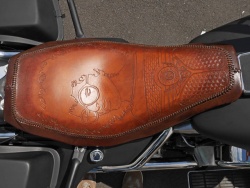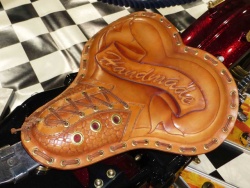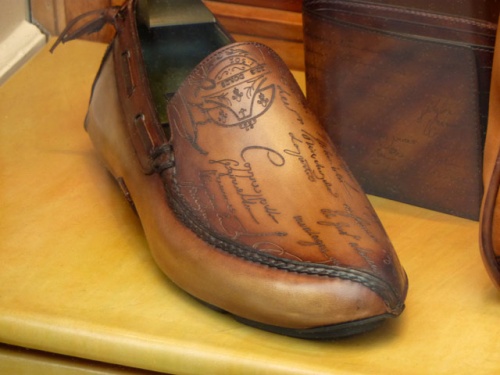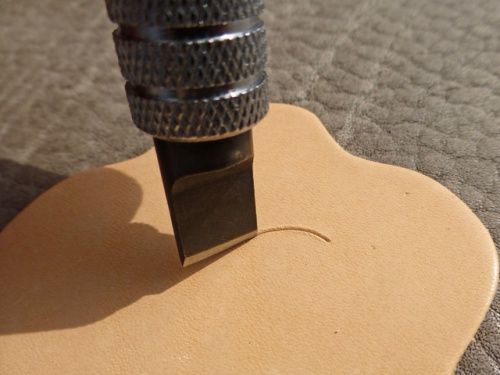Carving leather
A master of this craftsmanship: Stanley Au Leather Art from Hong Kong.
Contents
Carving leather - stamping leather
Carving is a traditional method of leather working and is used to add decoration. By means of carving tools (metal stamps cast into certain shapes), lines, grooves and patterns, such as monograms or coats of arms, are pressed, stamped and punched into the leather. Carving tools are available in many variations, shapes and sizes. They are also available with leaf shapes and embellishments.
Best for carving is thick, fine grained, Vegetable-tanned leather without binder-based finish. Such leather has the necessary stability for processing and displays the motifs much better. The motifs are applied with a hammer firmly on the leather. Such leather is usually moistened with a sponge or cloth beforehand. This is re-done on different areas of the leather and the process is repeated until the desired pattern is complete. Applying great force is not necessary. Due to the moistening, the leather fibre is swollen and deforms easily and remains stable after drying.
Basically, this work is very easy. But as with all the arts, there are people who have a talent to "paint" motifs on leather.
For further adornment, the leather can be painted, decorated with gold leaf or patinated with transparent leather colours.
Beautiful leather work.
Leather of Western saddles, belts or bags is more frequently carved. The technique was at a high point in Europe during the Middle Ages. Nowadays, this elaborate leather work has become less prevalent. For Germany, it is estimated that less than ten percent of all saddlers are able to do such work. In the USA, carving leather is more common.
Larger motifs are embossed by means of embossing stamps.
Relatively new is the lasering of leather. This is considerably easier because no special manual sills are required. Using images, a PC and a laser, motifs are burnt into the leather surface.
Carved seat cushion in Lima, the capital of Peru.
Carved leather boots (DLM - German Leather Museum in Offenbach).
Carved leather boots and carved leather saddle from Jacob, F. Shoes.
Extraordinary fine work from the leather workshop of Selestudio.
Great art: the leatherwork by Stanley Au Leather Art from Hong Kong.
Carved motorcycle saddles with braiding.
Carved leather book covers of DragosMan.
Carved leather handbags and hunting bag of Selestudio.
Leather carving tools - Leather stamping tools
For carving and stamping of leather various tools are used to deform or cut the leather fibres.
Leather tools for processing leather. - Character sets.
Videos about carving
The carving of a flower in the leather workshop.
The carving of a western saddle in the leather workshop.
Leather cutting
Leather can be embossed or carved with motifs. Another technique is leather cutting, which comes from the Middle Ages. Here the leather is wetted (soaked), heated and then superficially cut with a sharp knife. It is not cut through. With a further leather tool, the cutting edges are then deformed and supplemented by motifs. This technique was used in book binding, weapon leather, boxes and chests.
Leather cutting in very old leather. Book cover (annual figures, etc.). - Ceremonial shield made of leather, Milan around 1540 (DLM - German Leather Museum in Offenbach).
Cutting work in new leather. - Shoe and bag from London.
A leather case with carved signatures by cutting.
Engraving calligraphy
Engraving calligraphy is leather art. Only very skilled specialists are able to transfer gold foil by heat so beautifully on leather.
Milling
For mass production, motifs are milled into leather. This ensures consistent optics and is much faster than manual work.
Shoes with hole punching and machine-milled decorative lines.
A video about painting on leather, perforating leather, carving leather, embossing leather and several other methods to create motifs on leather.
Other possibilities how to provide leather with designs
- Embossed leather
- Laser engraving - Laser cutting leather
- Perforated leather
- Hole punching
- Embroidery
- Leather seams
- Leather imprint
- Formed leather
- Painting on leather
- Braided leather
- Leather etching & engraving
- Leather tattoo
- Glued leather strips
- Burning designs on leather













































 a kotori web solution
a kotori web solution